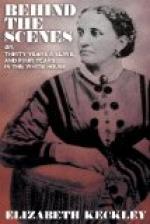* * * * *
Substitutes for coffee.
During the war everything was scarce and dear, and substitutes were devised for many of those things which had formerly been regarded as the necessaries of life. Sweet potatoes were peeled, then cut in small pieces and put out in the sun to dry. They were then used as a substitute for coffee, when that article became so scarce, toward the close of the war. Great quantities of this preparation were used. Okra was another substitute for coffee. It was dried in the pod, then the seeds shelled out, and these were dried again and prepared something as the coffee is. This made a delicious drink when served with cream, being very rich and pleasant to the taste. Quinine was a medicine that had been of almost universal use in the south; yet it became so scarce that it was sold at seven dollars a bottle, and could not often be had at that price. Lemon leaves were used as a substitute in cases of chills and fever. The leaves were made into a tea, and given to the patient hot, to produce perspiration. During an attack of chills, I was treated in this manner to some advantage. At any rate I got well, which can not always be said of all methods of treatment.
CHAPTER IV.
Rebellion weakening—slaves’ hopes strengthening.
* * * * *
M’GEES slaves taken to Alabama.




